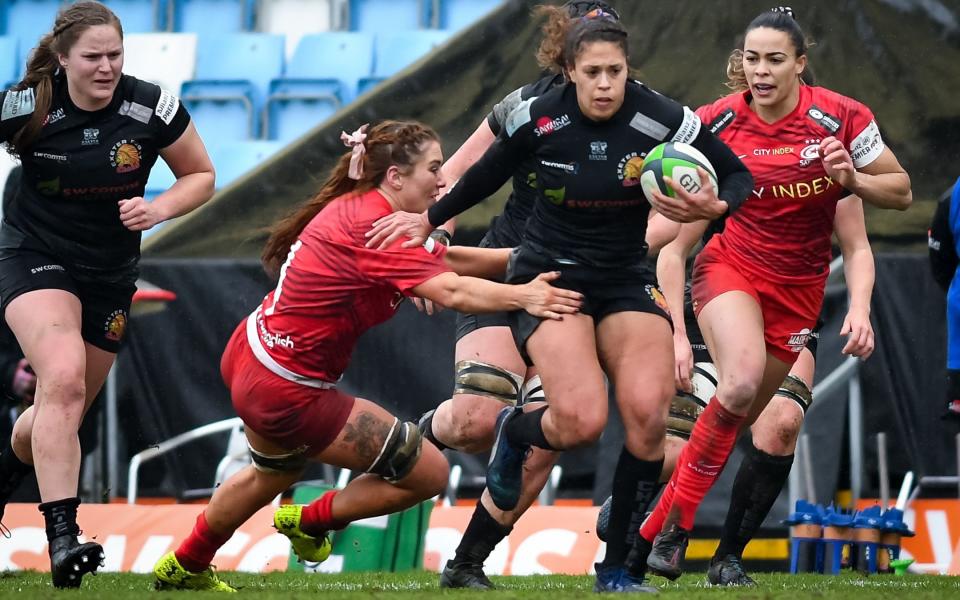The inside story of how Exeter Chiefs built a women's team from scratch and thrived in Premier 15s

Contrary to popular belief, the story of Exeter Chiefs’ women’s side did not begin at Sandy Park. The initial plans may have been hatched at the home of the Premiership and European champions, but it was Bristol’s Gordano services on the M5 where they spontaneously came alive.
Rob Baxter, the Chiefs’ long-standing director of rugby, had summoned Susie Appleby to the unlikely meeting point for an impromptu follow-up interview for the women’s head coach role. He had a good feeling about Appleby, a former assistant at the England women’s sevens squad who had finished as a runner-up in the BBC TV show ‘SAS: Are You Tough Enough?’ in the noughties.
"He looked me in the eye and said 'Susie, I’m going to say this to you and I think it’s pretty accurate. You’ve never been loved, supported or looked after by a sporting organisation, have you? I promise you, you will be loved at Chiefs'" recalls Appleby.
Baxter then put two and two together. Appleby’s father, Richard, the former president of the Rugby Football Union, had presented him with the Championship trophy on the day Exeter secured promotion to the Premiership in 2010.
Family irony has played just a small part in forging Chiefs’ successful first season in the Premier 15s. Despite recently missing out on a play-off spot, their maiden campaign in English women’s rugby’s top flight has seen them record wins against all of the league’s ‘big four’ - including two-time champions Saracens. They could surpass 50 points this weekend if they beat Gloucester-Hartpury in the final round of the season.
US international Gabby Cantorna is among the star-studded stats. As the second highest points kicker in the league, like Exeter’s other foreign imports, the inside centre dropped everything to cross the pond to play in the amateur league.
"For me, it’s probably the most professional environment I’ve been a part of," reflects Cantorna, who has benefited from one-to-one kicking sessions with Gareth Steenson, Exeter’s legendary fly-half who retired last season.
"Steeno’s been great. He’s been really helpful with my mindset and my actual kicking form. It’s been a real treat to come over here and have a lot of logistics and things looked after so we can just focus on our performance."
The part-time women are given cooked meals twice on their full training days - Tuesdays and Thursdays - and once on half days. As well as sharing the Sandy Park pitch, Appleby’s side are now reaping the rewards of equal representation across Exeter's unified social media platforms.
Cast your vote now for the @exeterchiefs Women's Try of the Season, pick from these top four contenders and post your option in the comments below pic.twitter.com/GgtKLUNltl
— Exeter Chiefs (@ExeterChiefs) May 7, 2021
"I’ve had parents email me about their daughters asking how they can become part of the Chiefs," beams Appleby. "The legacy is growing. We’ve got a girls' festival on June 2 and it’s sold out - it was filled within an hour. How big this becomes is down to ourselves, but also to the Rugby Football Union, in terms of how we’re allowed to develop."
The club has already played a part in accelerating change in the women’s game, having been a major voice in pushing for the league’s measly salary cap of £60,000 to be doubled next season.
Cynics have suspiciously eyed Chiefs’ industriousness as a threat to nurturing homegrown talent, but the development of 19-year-old scrum-half Flo Robinson and 21-year-old Merryn Doidge - who were included in England’s recent Six Nations squad - flaws such an argument.
Tony Rowe, the Exeter Chiefs’ chairman, is as disappointed as the next person that the young duo missed out on making their national debuts last week in Lille, when a floodlight failure forced England's match with France to be abandoned.
Having been in the stands cheering the women on at every one of their home fixtures, Rowe admits to being "pleasantly surprised" by the quality of his side, which was thrown together over Zoom this time last year.
Tellingly, the Chiefs registered three straight defeats at the start of the season, but the expertise of Appleby and her assistant, Amy Garnett, the first England women’s centurion, quickly turned it around to mastermind a seven-match winning streak.
"We started with a blank sheet of paper 18 months ago, Susie’s pulled a squad over the summer and the girls have just stepped up to it," says Rowe. "I’m the first person to tell you that professional sport is all about money, but it’s also about empowering the right people."
Having overseen Chiefs’ rise through the national leagues to the dizzying heights of Champions Cup glory, there are perhaps few better male allies in the game who can relate to the humble sacrifices that female players are currently having to make.
"I can remember back in the Championship days with Exeter Chiefs, around 2004, when we were semi-pro," reflects Rowe. "We had guys who were laying Tarmac out on the roads in the daytime and would come in late afternoon to do rugby training. The girls are the same at the moment - they have to go and hold down a job and then turn up to training - it’s a big commitment for little reward."
The four Chiefs who were named in the Lions squad this week warrants one last question. Judging on his team’s stellar debut season - and where the women’s game as a whole is headed - how confident is Rowe of counting future Lions among his women’s side? "I wouldn’t rule it out," he says.

 Yahoo Sport
Yahoo Sport 





































